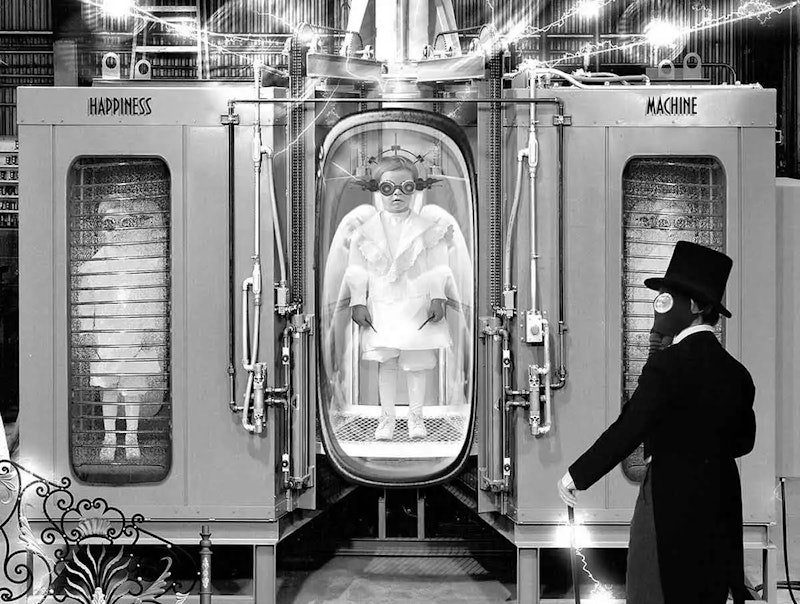I’ve long been intrigued by hypothetical scenarios that illustrate an underlying principle or problem that might be overlooked in assessing a complex situation; or alternatively, that show how some policy or doctrine, stated simply, might play out amid real-world complexities and practicalities.
At NYU in the 1980s, I had a professor, Israel Kirzner, economist of the free market “Austrian school,” who propounded a concept called “finders-keepers” with regard to property rights. The idea was that entrepreneurs discover value that others haven’t perceived, and therefore have a right to profit from exploiting that value. Kirzner gave a hypothetical of someone finding a water source in a desert; the person would have a right to use this asset, not regard it as someone else’s or the community’s. Kirzner acknowledged a possible limit to that principle, in a scenario where one knowingly snatches an unclaimed container of water away just before someone else, who’s dying of thirst, is about to find it.
In 2010 or so, I had a disagreement with a Ron Paul supporter about property rights. Arguing that they were limited and conditional, not absolute, I suggested a hypothetical in which someone’s parked a car on a street (let’s assume parking’s allowed 24/7) and not returned to it. At some point, I said, that car will be declared abandoned property and towed away. My interlocutor, one of the regulars at debates held in the basement of Lolita’s Bar in Manhattan, wasn’t putting up with that socialism. The car, in his view, should be left there however long it lasted, immovable without the owner’s consent.
I saw that conversation as a data point indicating the right was going off the rails. But I now feel some nostalgia for that kind of right-wing extremist, one who pushes a defensible principle beyond where I think it should go. These days, right-wing polemics generally revolve around personal priorities: whatever will generate “liberal tears” or serve Donald Trump’s interests. Recently, the crowd at a Trump rally chanted “Genocide Joe,” a left-wing phrase about Biden’s policies on Israel and Gaza, spurring Trump to say, “They’re not wrong.” No hypothetical on how Trump’s policies would differ was implied, reminding me of physicist Wolfgang Paul’s phrase that something vacuous is “not even wrong.”
A recent Splice Today article on abortion, by Tom Joyce, brought to mind the type of hypothetical that adds, rather than removes, detail, in an effort to assess real-world implications. Joyce wrote: “The law should bar elective abortions at any stage in a pregnancy. Exceptions should exist for rape, incest, the life of the mother, severe health complications for the mother, certain severe disabilities, or to protect the life of an unborn child (selective reduction).” I wondered how that would work in practice. Would panels of judges and doctors make the assessments? Would they reconvene every time a scan provides new info about the status of fetus and mother? Would they debate whether a rape’s occurred (as this would be long before a conviction)? Would an industry of abortion consultants arise to game this system?
Einstein employed thought experiments to analyze how physical principles would play out. He contemplated, for example, what one would see if riding on a wave of light. Reading frequently about physics growing up, I assumed this technique was a widely known part of science history, yet in a long-ago conversation with my uncle—a medical scientist who’d published extensively about lab and clinical results—he initially chortled at “thought experiment” as some eccentric notion I’d concocted. The concept’s attractiveness in a particular field depends on empirical data not being readily available.
In one of philosophy’s most influential thought experiments, Robert Nozick imagined an “experience machine” that would offer a lifetime of pleasure, and no suffering, to someone instead of the mixed experiences they’d have in the real world. He asked whether such a condition would be preferable to real life, and if not, what’s needed for well-being beyond just pleasure and a lack of suffering. First raised in the 1970s, the debate continues today. My thought is that I don’t trust whoever’s running the machine. For a similar reason, I don’t find appeal in cryonics, the idea of having your head frozen upon death in hopes that future technologists can revive you. I’m not confident that, upon resurrection, I won’t be conscripted into a lab experiment, cyborg army or some other project I haven’t chosen.
—Follow Kenneth Silber on Threads: @kennethsilber

